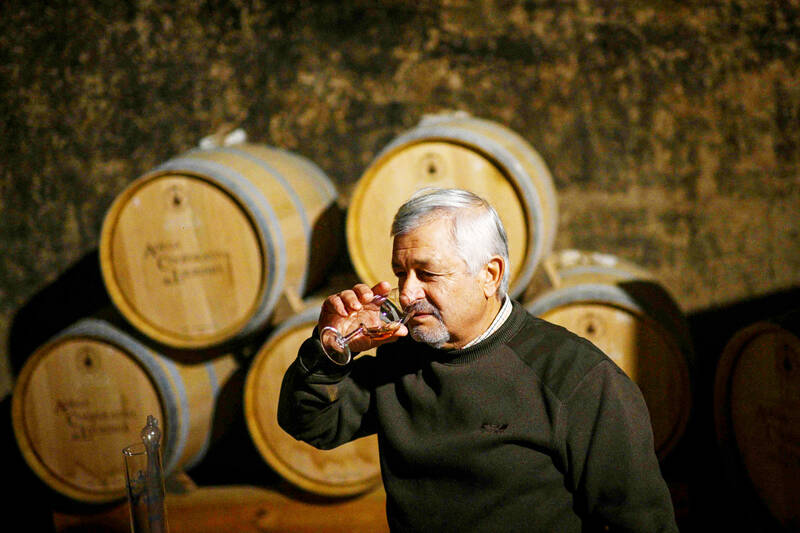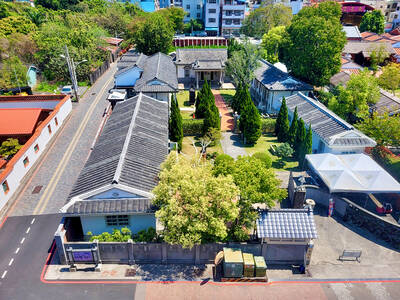Whether it is the waft of clove-studded oranges or the crisp fragrance of a fir tree, the festive season is filled with aromas that conjure Christmases past. Now researchers say our sense of smell, and its connection to our memory, could be used to help fight dementia.
Our senses can worsen as a result of disease and old age. But while impairment to hearing or vision is quickly apparent, a decline in our sense of smell can be insidious, with months or even years passing before it becomes obvious.
“Although it can have other causes, losing your sense of smell can be an early sign of dementia,” said Leah Mursaleen, the head of research at Alzheimer’s Research UK, adding it was a potential indicator of damage in the olfactory region of the brain — that is, the part of the brain responsible for smell.

Photo: AFP
That has led to researchers examining whether loss of smell could be used to diagnose conditions such as Alzheimer’s long before symptoms such as memory loss set in — an approach, experts say, that could allow patients access to drugs such as lecanemab early in the course of the disease, when they work best to slow cognitive decline.
But just as research has suggested the use of hearing aids could reduce the risk of developing dementia, questions are being asked about whether bolstering our sense of smell could do the same. Could a declining sense of smell be a risk factor for cognitive decline, not just a symptom?
“Olfaction is intimately involved in many brain processes, and especially the emotional processing of stimuli,” said Thomas Hummel, of Technische Universitat Dresden. Indeed, smells, memories and emotions are often tightly bound, with research revealing recollections triggered by scent tend to be rooted in our childhood.

Photo: AFP
“If olfactory function fails, stimuli lose salience, which may affect general cognitive functions,” said Hummel.
Neurons involved in the olfactory system are also involved in other systems in the brain. Indeed, as Hummel and others note, some areas of the brain play a key role in cognitive and olfactory processes. As a result, if the sense of smell becomes dysfunctional, cognitive processing might also be affected.
A number of studies have found that exposure to certain odors can either boost or hinder cognition, while work by Hummel and colleagues has suggested smell training in older people can improve their verbal function and subjective wellbeing.
More pertinent still, a small study published last year by researchers in Korea, revealed that intensive smell training led to improvements in depression, attention, memory and language functions in 34 patients with dementia compared with 31 participants with dementia who did not retrieve such training.
“We’ve already seen some early studies suggesting that ‘training’ our sense of smell, through repeated exposure to strong-smelling substances, could have benefits in improving cognitive performance in certain tasks,” said Mursaleen.
“However, much more research is needed to understand whether things like olfactory training could help prevent or slow down the onset and progression of mild cognitive impairment and dementia.”
Among other problems, intensive scent training takes time and effort. In an attempt to solve this problem, Michael Leon, professor emeritus at the University of California, Irvine, and his team have come up with a device called “Memory Air that emits 40 different smells twice a night, while people are sleeping — an approach Leon says allows “universal compliance.”
The hope is that exposing people to more smells, even when they are asleep, could strengthen their olfactory abilities.
The team is about to start a large trial with the gadget among older adults without dementia, building on a smaller study that suggested the approach could improve memory performance in such participants.
“We will then start a large trial with Alzheimer’s patients using that device,” said Leon.
In another small study, Alex Bahar-Fuchs, a clinical neuropsychologist at Deakin University, Australia, is looking at whether training cognitively healthy older adults to distinguish smells using a scent-matching memory game can help improve wider aspects of memory and cognition, compared with using a similar game based on matching pictures. The approach, he said, goes further than passive exposure to odors by setting cognitive tasks for participants.
“We believe that the neuroplastic properties of the olfactory centers in the brain might make it more likely that improved performance on olfactory memory will generalize, or transfer, to memory functions more broadly,” he said.
Meanwhile, Victoria Tischler, at the University of Surrey, is working to learn more about how our olfactory function changes as we age normally.
As part of their work, the team hopes to produce olfactory training kits suitable for healthy older people, those with mild cognitive impairment, and those living with dementia in care homes.
Tischler said it was important to cherish our most enigmatic sense.
“I would advise the public to look after their sense of smell, much like they look after other aspects of their sensory health” such as their eyesight, she said.

April 28 to May 4 During the Japanese colonial era, a city’s “first” high school typically served Japanese students, while Taiwanese attended the “second” high school. Only in Taichung was this reversed. That’s because when Taichung First High School opened its doors on May 1, 1915 to serve Taiwanese students who were previously barred from secondary education, it was the only high school in town. Former principal Hideo Azukisawa threatened to quit when the government in 1922 attempted to transfer the “first” designation to a new local high school for Japanese students, leading to this unusual situation. Prior to the Taichung First

Chinese Nationalist Party (KMT) Chairman Eric Chu (朱立倫) hatched a bold plan to charge forward and seize the initiative when he held a protest in front of the Taipei City Prosecutors’ Office. Though risky, because illegal, its success would help tackle at least six problems facing both himself and the KMT. What he did not see coming was Taipei Mayor Chiang Wan-an (將萬安) tripping him up out of the gate. In spite of Chu being the most consequential and successful KMT chairman since the early 2010s — arguably saving the party from financial ruin and restoring its electoral viability —

The Ministry of Education last month proposed a nationwide ban on mobile devices in schools, aiming to curb concerns over student phone addiction. Under the revised regulation, which will take effect in August, teachers and schools will be required to collect mobile devices — including phones, laptops and wearables devices — for safekeeping during school hours, unless they are being used for educational purposes. For Chang Fong-ching (張鳳琴), the ban will have a positive impact. “It’s a good move,” says the professor in the department of

Toward the outside edge of Taichung City, in Wufeng District (霧峰去), sits a sprawling collection of single-story buildings with tiled roofs belonging to the Wufeng Lin (霧峰林家) family, who rose to prominence through success in military, commercial, and artistic endeavors in the 19th century. Most of these buildings have brick walls and tiled roofs in the traditional reddish-brown color, but in the middle is one incongruous property with bright white walls and a black tiled roof: Yipu Garden (頤圃). Purists may scoff at the Japanese-style exterior and its radical departure from the Fujianese architectural style of the surrounding buildings. However, the property